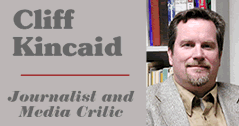AMERICAN JOURNALISM: FROM FARCE TO FRAUD TO ESPIONAGE
By Cliff
Kincaid
April 14, 2014
NewsWithViews.com
You may have heard that the fake anchorman Ron Burgundy is the star of an exhibit at the Newseum, a building in Washington, D.C. that honors the pursuit of the First Amendment right to freedom of the press. I like a joke, but featuring some props, costumes and footage from the 2004 comedy, “Anchorman: The Legend of Ron Burgundy,” doesn’t strike me as a fitting tribute to the journalism profession. But the thinking of the media elitemust be that if people are laughing at you, at least they’re paying attention to what you do for a living. Grabbing and maintaining that audience is the name of the game, even if you do the news without pants.
On Monday, another fateful decision for the media will be made. Sig Gissler, administrator of the Pulitzer Prizes since 2002, will announce this year’s winners. Burgundy is not in the running (to my knowledge), but Edward Snowden’scomrades in the media are. It will be a tragedy for the journalism business if Russian espionage comes away this year as a winner. Vladimir Putin will be laughing all the way into Western Ukraine.
At the same time that the Pulitzer board grapples with the issue of honoring the manipulation of the media by the Russian propagandists in charge of the Snowden operation, it should be taking another look at the Pulitzer awarded 82 years ago to Walter Duranty of The New York Times. His stories about the USSR, which paved the way for official U.S. recognition of the communist regime, ignored the mass murder of millions of Ukrainians in a forced famine engineered by Joseph Stalin. This remains a major black eye for the Pulitzers, and continues to serve as evidence of the corruption of the journalism business.
On Monday, at a news conference in New York City, and later at Columbia University itself, a group of concerned citizens will be asking for higher ethical standards for the press, in terms of avoiding any honors to Snowden’s media collaborators, and again asking for Duranty’s prize to be revoked.
I decided to hold these events, on this important day for American journalism, because of Accuracy in Media (AIM) founder Reed Irvine’s influence, stemming from my early days at AIM when he told me about the travesty of the Duranty Pulitzer and the suffering of the people of Ukraine. I worked with Reed on numerous occasions, especially at stockholder meetings of The New York Times, to strongly urge the owners of the paper, the Sulzbergers, to give back the award and disavow Duranty’s reporting. They decided to have an investigation of the matter and leave it in the hands of the Pulitzer board, which ruled in 2003 that there was no hard evidence of deliberate deception on Duranty’s part. That claim is false, since the famous Kliefoth memorandum proves that Duranty knew his stories were propaganda for the Soviets. Kliefoth, an American diplomat, had talked to Duranty about his work, noting that Duranty himself admitted his stories were cleared by the communist regime.
Former KGB colonel Oleg Gordievsky, a former highest-ranking Soviet spy, wrote in the book, KGB: The Inside Story, that “One of the most successful Soviet ‘active measures’ of the 1930s was to persuade most of the outside world, as well as gullible Western visitors and journalists actually in the Soviet Union, that one of the worst famines in modern history was no more than a piece of anti-Soviet propaganda.” He names Duranty as one of these “gullible” journalists. The Kliefoth memorandum demonstrates that the problem went beyond gullibility. Duranty was a Soviet agent of influence; he knew what he was doing.
Ray Gamache, Ph.D, Assistant Professor of Mass Communications at King’s College, agrees, telling me, “The best evidence against Duranty and the Times is the Kliefoth memorandum from 1931, which proves unequivocally that the Times and Soviet authorities had agreed to publish his official dispatches, little more than pure propaganda.”
Gamache has written a powerful book on Gareth Jones, recognized as one of the first journalists to reveal the horror of the Soviet-induced famine. The book is titled, Gareth Jones: Eyewitness to the Holodomor.
In a July 2, 1999 letter to Seymour Topping, then the administrator of the Pulitzer Prizes, Reed Irvine urged the revocation of the award in the context of the suffering of the people of Ukraine, noting, “The famine was planned by Stalin to destroy the opposition to his collectivization program in the Ukraine.”
Irvine went on to note that another fake—Janet Cooke’s story in The Washington Post about a child heroin addict who did not exist—won a Pulitzer Prize. The Post gave back the award after the fraud was exposed.
Irvine said, “Correcting errors is supposed to be a hallmark of good journalism. Awarding the Pulitzer Prize to Walter Duranty was obviously a monumental error, and it cries out for correction. Of course, it is not the only one that has ever been made. I don’t recall the board refusing to accept the Washington Post’s return of the prize awarded to Janet Cooke in 1981. Admitting that her selection was a serious mistake was the honorable thing to do. It is hard to conceive of the board allowing that award to stand had Ms. Cooke refused to give it up.”
In the case of Duranty’s Pulitzer, we are looking at the fate of millions of people and the future of a nation: Ukraine. The Janet Cooke story led the Washington, D.C. police on a wild goose chase for the fictitious child that cost money, not lives.
Irvine added that revoking an award “would signal that honesty and accuracy are indispensable requirements both for stories nominated for Pulitzer Prizes in the future and for those that have won them in the past.If this is not done, the prize will lose respect. It will signal that the standards for integrity and honesty demanded of journalists are lower than those demanded of pop singers by the National Academy of Recording Arts and Sciences.”
He was referring to the Academy revoking a 1989 Grammy awarded to a group called Milli Vanilli, when it was discovered that the “singers” had lip-synched the voices of others.
“Trust in journalists and the media is at a low ebb,” Irvine said at the time. “One journalistic organization recently recommended that those who hand out awards to journalists pay more attention to the accuracy of the stories they honor. When flawed stories win prizes, respect for journalism plummets.”
The situation can only get worse for the media if the Pulitzer board honors the work of those who have facilitated the espionage operation of Edward Snowden.
The damage will be compounded by the public recognition that Snowden’s theft of classified information and leaks to the media have not only damaged America’s national security, but enabled the Russian military to manage the infiltration and invasion of Ukraine, as The Wall Street Journal revealed, in a manner that evaded U.S. electronic and intelligence intercepts.
It is safe to say that most of the damage caused by Snowden has not yet been realized. But Putin’s aggression is damaging enough to people who have alreadysuffered for far too long at the hands of the media and their communist manipulators.
|
Unlike Ron Burgundy, this is not a laughing matter.
• Join us in New York City on April 14, from 11:00 am to 12:30 p.m., at the Women’s National Republican Club (Lincoln Room), 3 West 51st Street, New York, New York. Walter Zaryckyj, executive director of the Center for U.S.-Ukrainian Relations, will join Cliff Kincaid, director of the Accuracy in Media Center for Investigative Journalism, to comment on the impending announcements by the Pulitzer Prize board. Comments will also be available later in the day, from 3:30 to 4:00 p.m., outside Columbia’s Graduate School of Journalism (The main entrance is on Broadway at West 116th Street), after the official announcements are made. Contact Phil Kent at philkent@philkent.comor (404) 226-3549.
© 2014 Cliff Kincaid - All Rights Reserved
Cliff Kincaid, a veteran journalist and media critic, Cliff concentrated in journalism and communications at the University of Toledo, where he graduated with a Bachelor of Arts degree.
Cliff has written or co-authored nine books on media and cultural affairs and foreign policy issues. One of Cliff's books, "Global Bondage: The UN Plan to Rule the World" is still awailable.
Cliff has appeared on Hannity & Colmes, The O’Reilly Factor, Crossfire and has been published in the Washington Post, Washington Times, Chronicles, Human Events and Insight.
Cliff Kincaid is president of America’s
Survival, Inc.
E-Mail: cliff.kincaid@aim.org














 Share
This Article
Share
This Article






